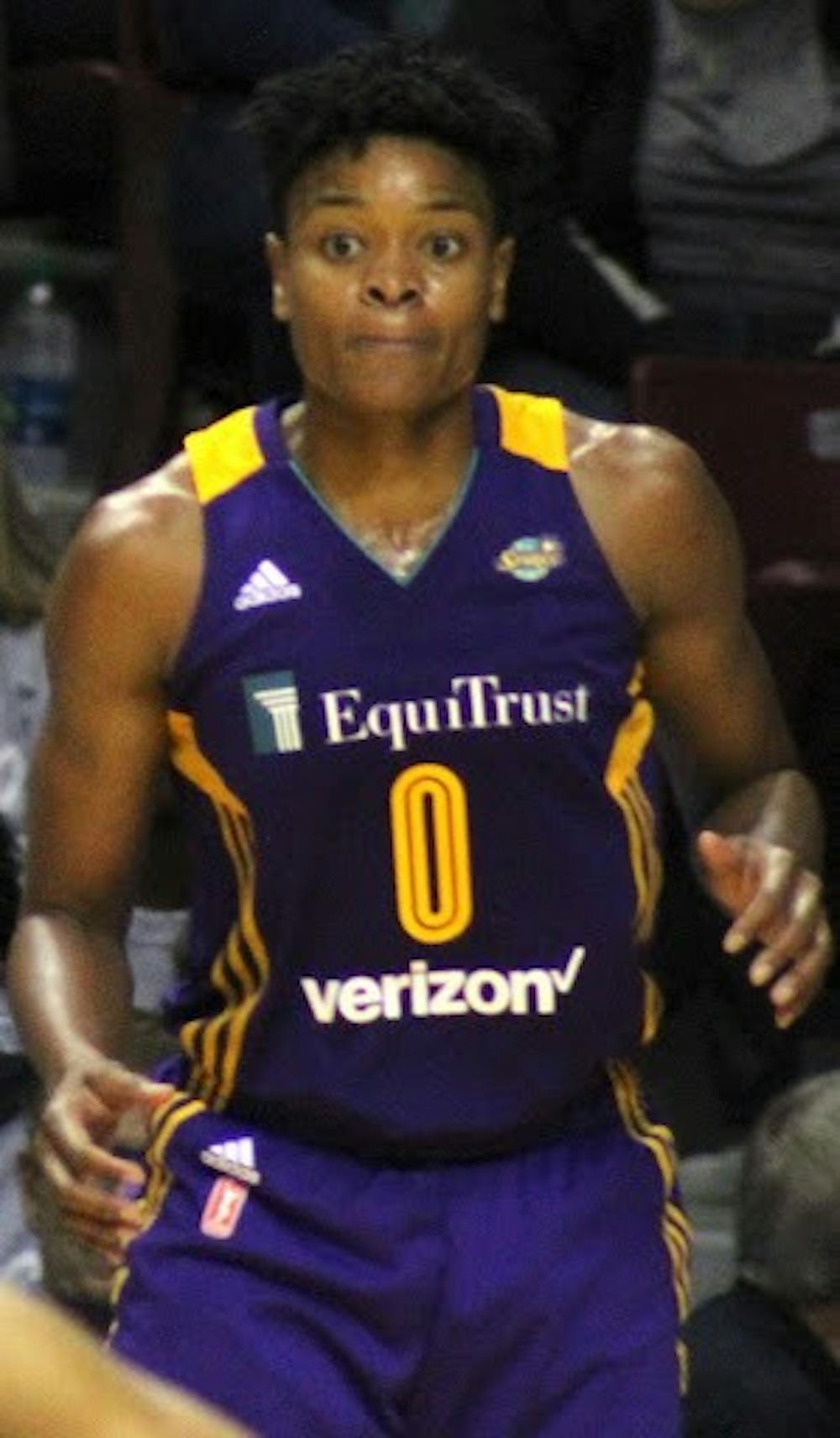“With the second pick of the 2004 WNBA draft, the Washington Mystics select Alana Beard,” announced commissioner Val Ackerman.
The pick was exciting news for the Mystics, who ended the 2003 season last in the Eastern Conference with a 9-25 record. The Mystics had just drafted a star player from Duke who they hoped would turn things around for the team.
The pick was exciting for Alana Beard, too.
“At the end of the day, I wanted to just play basketball,” Beard said in an interview with The Eagle. “What I loved is that I was capable of staying on the East Coast, and the fact that I was capable of continuing my career beyond college meant a lot.”
Beard said that during her time with the Mystics, the things she valued the most were the relationships that were built with her teammates.
“I had the privilege of playing with Murriel Page, Chamique Holdsclaw, Nakia Sanford, Chastity Melvin and Taj McWilliams-Franklin,” Beard said. “Those individuals were well into their careers, and very experienced in terms of being a professional. I had those five women to look up to, which I can say really helped me develop as a veteran when it was my time and how I mentored and supported younger individuals.”
Beard immediately dominated in her rookie season with the Mystics. She led the team in steals, assists, blocks and minutes played while starting all 34 games and averaging 13.1 points. Beard set a franchise record for most steals in a season with 69, and was a candidate for both Defensive Player of the Year and Rookie of the Year.
In her next five seasons with the Mystics, Beard led the team in scoring for all five years, was named a WNBA All-Star four times, three of which she was named as starter, earned WNBA All-Defensive Team honors three times and was named to the WNBA All-Defensive First Team once. Beard holds the record for All-Time steals leader in Washington Mystics history.
Beard’s time with the Mystics was only a sign of what was to come.
In 2012, Beard signed with the Los Angeles Sparks. In her time in Los Angeles, Beard was named WNBA All-Defensive First Team four times, named WNBA All-Defensive Second Team once and consecutively named WNBA Defensive Player of the Year in 2017 and 2018. She became a WNBA Champion in 2016 when the Sparks defeated the Minnesota Lynx.
In 2019 Beard played her last season, retiring with 419 games played, 4,740 points, 1,420 rebounds, 1061 assists and 710 steals, placing her 3rd for all-time steals in WNBA history.
Fifteen years and a WNBA legacy later, Beard chose to retire and return to the same city that she started her career in — Washington, D.C.
“I love everything about D.C. I think when you move away, you take for granted the history and the beauty that the city has to offer,” Beard said. “On top of that, it’s the people, it’s the food, it’s the diversity of the landscape that is something that is extremely beneficial, but fortunate to have.”
Although Beard had a great impact on the court, her legacy extends far beyond the sidelines.
Beard is also the face of a woman-led ownership bid for a WNBA expansion in Oakland. She has partnered with the African American Sports & Entertainment Group in Oakland in an effort to create a Black-owned WNBA franchise. The AASEG won a vote in July 2021 by the Oakland city council, giving them a lease for the Oakland Arena.
“We have had the most women apply for the WNBA draft ever, in the history of the league. And the fact that probably 12, if that, will land a spot on a team is heart breaking. Either the league needs to expand the roster or expand the landscape of the WNBA, because there are so many young women who are working their butts off to achieve their dream of playing in the WNBA and there are only 144 spots available,” Beard said.
Beard said the last few years have indicated that women’s sports are here to stay. She said investing in women’s sports even on the collegiate level is a positive thing for women across all levels of athletics.
“The fact that this year was the first year that the NCAA has received more money and marketing dollars than any other year is a great indication that if you put money behind women, and women in sports, you’re going to get a positive outcome,” Beard said.
Beard also co-founded Transition Play, a program that helps college, pro and recently retired athletes transition into life beyond the game. They help to build and strengthen skills that can be used in the professional world.
Beard said she felt a responsibility to use the network she built during her playing career to help provide opportunities and access for female athletes that look exactly like her.
“As I went through my journey, you understand that it is a tough transition for anyone, let alone an athlete who’s been playing the game of basketball for a great portion of their life,” Beard said. “The fact that I felt overwhelmed, the fact that I didn’t have the confidence that I wanted to have in this space, considering the amount of preparation I did prior to that transition, was a great indication that a platform that is dedicated to female athletes helping them to transition to life after the game, was needed.”
Beard said because of what female athletes have been through and sacrificed throughout their careers, they are capable of bringing value to any organization.
“I would encourage female athletes to follow their passion, and explore different opportunities that could become new passions,” Beard said.





